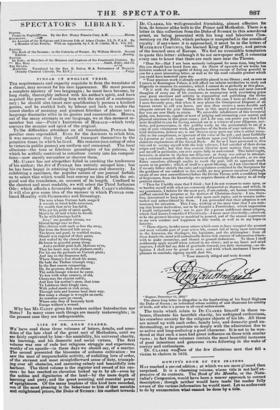PINDAR IN ENGLISH VERSE.
THE acquirements and capacity requisite to form the translator of a classic, may account for his rare appearance. He must possess a complete mastery of two languages ; he must have become, by long study, thoroughly imbued with his author's spirit, and have acquired the power of reading him, with the mind of a contempo- rary; he should also (most rare qualification !) possess a kindred genius, and be enabled both by labour and luck to render the nicest shades of meaning and greatest felicities of phrase into a language dissimilar alike in its genius and construetion. Hence, out of the many attempts in our language, we at this moment re- member but one—Pops's Imitations of HORA.CE—which truly conveys the manner and spirit of the original. To the difficulties attendant on all translations, PINDAR has peculiar ones superadded. Even for the Ancients to relish him, it was necessary that they should transport themselves to the primitive times in which he lived. His remains (consisting of odes to victors in public games) are uniform and occasional. The local allusions—the true or fabulous genealogies of his- patrons, by which he artfully contrived to introduce variety into his composi- tions—now merely encumber or obscure them.
Mr. CAREY has not altogether failed in catching the tenderness of his author; thefire of PIND4R has entirely escaped him; but he has been happy in attaining his ruggedness and obscurity. In exhibiting a specimen, the popular nature of our journal forbids us to select that which would best convey an idea of both the ori- ginal and the translation, on account of its length. Confined to the shortest and most readable, we will select the Third Isthmian Ode; which affords a favourable sample of Mr. CAREY'S abilities. It will also give some idea of the manner in which PINDAR com- bined Morality with Gymnastics and Genealogy.
The man whom Fortune bath assigal
A wreath in listed fields entwined, Or wealth that ne'er has fail'd, Who yet his pride of spirit quells, Merits by all mid whom he dwells To be with blessings haird. Jove ! our greatest virtues, we Mortal beings owe to thee. Bliss thrives with such as fear thy sway, But from the froward falls away.
The brave and good, in warbled strains, Should win requital of their pains, And wafted by the choral throng,
Be borne in graceful pomp along.
And a twofold prize hath Melissus ta'en, That his heart may with gladness swell; For his are the garlands on Corinth plain; And late in the deepsome dell, Where Nemea's lion shook his mane, He bade the Theban triumph ring; In the fleet course conquering.
He, for prowess, doth not shame The noble lineage whence he came.
Ye ken with what renown, of old, Cleonymus the chariot roll'd ; And bow his mother's stem, that trace
To Labdacus their kingly race,
With yoked steeds in rich array, Through toils and honour bent their way. But many a change is wrought on earth, As ceaseless years go round, Where only they of heavenly birth Escape without a wound.
Why has Mr. CAREY given his readers neither Introduction nor Notes? In many cases such things are merely makeweights; in the present case they are indispensable.






















 Previous page
Previous page